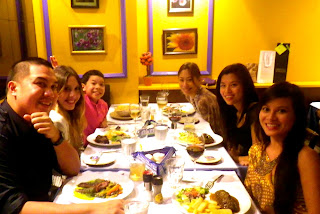Sunday, October 28, 2012
Thursday, October 25, 2012
Wednesday, October 24, 2012
When Good People Work for Bad Companies
You consider yourself to be a decent person. You pride yourself on your conscience, and are discerning in what you buy and consume. Yet every day you get dressed, eat breakfast and go to work for a company you think hurts other people and the planet.
This presents a terrible conundrum for millions of us. Too many industries do harm in the world — whether through their actual practices, their lobbying efforts, or their treatment of the environment or of workers. They have lofty mission statements and attempt to mitigate this harm by donating to some good causes. But part, or all, of their bottom line is built on doing or abetting bad stuff.
Meanwhile, in this flagging economy, many of us are glad to have work at all. It's difficult to think about quitting a decent-paying job simply because of the values of the person in the mirror. Instead of thinking about whether the work of our brains and hands actually helps to abet evil, we regularly engage in various moral trade-offs to make ourselves feel better. This isn't uncommon; as my friend Dan Ariely has noted, we all cheat — but only by enough to allow us to live with ourselves. In the end, human beings can justify anything. But when, in your heart, do you know that you have crossed your own line? And what should you do then?
I came to ponder this conundrum following the too-early death of a friend, an extraordinary guy named Gregor Barnum.
After earning a master's degree in ethics at Yale, Gregor became the first director of corporate consciousness for Burlington, Vermont-based Seventh Generation, the nation's leading manufacturer of environmentally-friendly household and personal care products. In this role, Gregor helped to infuse the company with the kind of conscious, ethical values that its products represent. (You can read a 2006 interview with him here.) Upending traditional, linear practices and redesigning the way companies do business, Gregor believed, is critical if people and the planet are to survive. (Gregor left Seventh Generation when Jeffrey Hollender, the company's founder, stepped down as CEO.)
"Gregor refused to stop asking tough questions about the meaning and purpose of life," Hollender says. "What was it that he was here to do? Was he doing it? How could he do it better?"
Even with the smallest of actions, Gregor was all about conscience. During his long runs in the countryside, for example, he would pick up trash alongside the road.
I keep asking Gregor's spirit what he would say to people who feel stuck between the rock of their paychecks and the hard place of their consciences. He would likely answer with a simple statement: "You already know what to do. Find others in the company who think as you do. And if you can't find them, and if you can't look at yourself, you must leave and make your own thing. Do it better."
Forcing people to look at their own ethical balancing acts was part of Gregor's MO. "He had a sixth sense for finding good people," Hollender observes, "and just as acute a sense for those still struggling with their own evil."
I don't have any easy answers, and am still working out my own balancing act. But there's one thing I do know: we can't stop thinking about our own ethical tradeoffs and how we cope with conflicted feelings about our work. When I get asked to take on a freelancing assignment, I need to do due diligence on the client and the firms I'm being asked to write about. I've learned, through my own hard experience, that this is important if I am to live with myself. And sometimes I just have to pass.
In the end, maybe it's more about finding the right metric, one we can feel good about as we try to define our legacy to the world and ourselves.
Harvard Business School professor Clayton Christensen, during his battle with cancer, helped answer his own ethical questions by looking inward. At the end of his Harvard Business Review article, "How Will You Measure Your Life?," he wrote, "I have a pretty clear idea of how my ideas have generated enormous revenue for companies that have used my research; I know I've had a substantial impact. But as I've confronted this disease, it's been interesting to see how unimportant that impact is to me now. I've concluded that the metric by which God will assess my life isn't dollars but the individual people whose lives I've touched."
Even if we aren't celebrated Harvard professors, the work we all do daily touches hundreds, thousands, or millions of people, directly and indirectly. We touch them through our actions and non-actions, and through the actions and non-actions of our employers.
At the end of the day, we all need to think about how we measure our lives in the context of our work. We need to ask, as honestly as we can, whether our work is making the world better or worse. Choosing to say no to plunder and greed isn't easy, but at the end of one's life it will probably feel like the right decision.
This presents a terrible conundrum for millions of us. Too many industries do harm in the world — whether through their actual practices, their lobbying efforts, or their treatment of the environment or of workers. They have lofty mission statements and attempt to mitigate this harm by donating to some good causes. But part, or all, of their bottom line is built on doing or abetting bad stuff.
Meanwhile, in this flagging economy, many of us are glad to have work at all. It's difficult to think about quitting a decent-paying job simply because of the values of the person in the mirror. Instead of thinking about whether the work of our brains and hands actually helps to abet evil, we regularly engage in various moral trade-offs to make ourselves feel better. This isn't uncommon; as my friend Dan Ariely has noted, we all cheat — but only by enough to allow us to live with ourselves. In the end, human beings can justify anything. But when, in your heart, do you know that you have crossed your own line? And what should you do then?
I came to ponder this conundrum following the too-early death of a friend, an extraordinary guy named Gregor Barnum.
After earning a master's degree in ethics at Yale, Gregor became the first director of corporate consciousness for Burlington, Vermont-based Seventh Generation, the nation's leading manufacturer of environmentally-friendly household and personal care products. In this role, Gregor helped to infuse the company with the kind of conscious, ethical values that its products represent. (You can read a 2006 interview with him here.) Upending traditional, linear practices and redesigning the way companies do business, Gregor believed, is critical if people and the planet are to survive. (Gregor left Seventh Generation when Jeffrey Hollender, the company's founder, stepped down as CEO.)
"Gregor refused to stop asking tough questions about the meaning and purpose of life," Hollender says. "What was it that he was here to do? Was he doing it? How could he do it better?"
Even with the smallest of actions, Gregor was all about conscience. During his long runs in the countryside, for example, he would pick up trash alongside the road.
I keep asking Gregor's spirit what he would say to people who feel stuck between the rock of their paychecks and the hard place of their consciences. He would likely answer with a simple statement: "You already know what to do. Find others in the company who think as you do. And if you can't find them, and if you can't look at yourself, you must leave and make your own thing. Do it better."
Forcing people to look at their own ethical balancing acts was part of Gregor's MO. "He had a sixth sense for finding good people," Hollender observes, "and just as acute a sense for those still struggling with their own evil."
I don't have any easy answers, and am still working out my own balancing act. But there's one thing I do know: we can't stop thinking about our own ethical tradeoffs and how we cope with conflicted feelings about our work. When I get asked to take on a freelancing assignment, I need to do due diligence on the client and the firms I'm being asked to write about. I've learned, through my own hard experience, that this is important if I am to live with myself. And sometimes I just have to pass.
In the end, maybe it's more about finding the right metric, one we can feel good about as we try to define our legacy to the world and ourselves.
Harvard Business School professor Clayton Christensen, during his battle with cancer, helped answer his own ethical questions by looking inward. At the end of his Harvard Business Review article, "How Will You Measure Your Life?," he wrote, "I have a pretty clear idea of how my ideas have generated enormous revenue for companies that have used my research; I know I've had a substantial impact. But as I've confronted this disease, it's been interesting to see how unimportant that impact is to me now. I've concluded that the metric by which God will assess my life isn't dollars but the individual people whose lives I've touched."
Even if we aren't celebrated Harvard professors, the work we all do daily touches hundreds, thousands, or millions of people, directly and indirectly. We touch them through our actions and non-actions, and through the actions and non-actions of our employers.
At the end of the day, we all need to think about how we measure our lives in the context of our work. We need to ask, as honestly as we can, whether our work is making the world better or worse. Choosing to say no to plunder and greed isn't easy, but at the end of one's life it will probably feel like the right decision.
by Bronwyn Fryer
HBR Blog
Sunday, October 21, 2012
Subscribe to:
Posts (Atom)































































